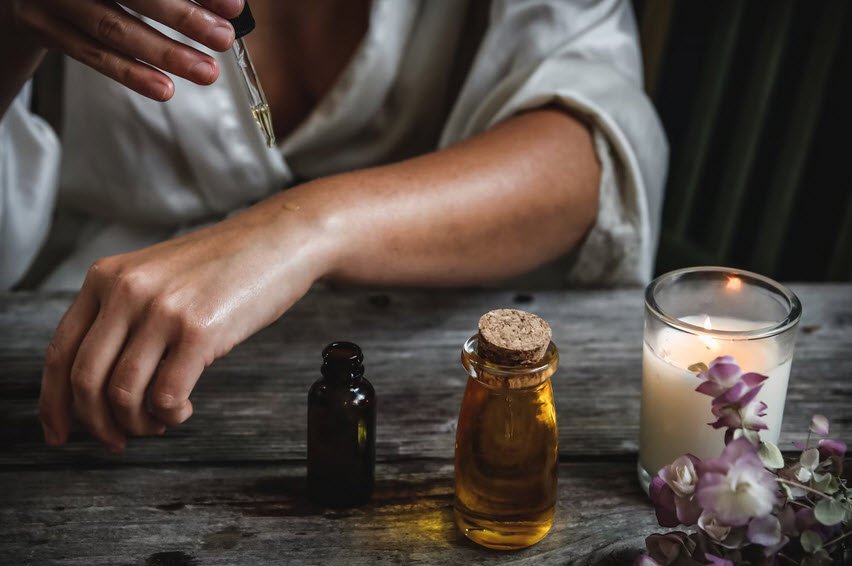
Aromatherapy is the art and science of using pure essential oils extracted from natural plants and flowers. Essential oils are used to calm, balance and give energy to the body, mind and spirit.
Essential oils are obtained from flowers, plants, trees, shrubs and roots or from the peels of fruits. The oils are either steam distilled or expressed. The climate, weather and temperature at distillation can affect the quality of the oil, which in turn will affect the chemical structure.
When using essential oils for personal and health-related care, it is best to use plant parts that are free from toxic chemicals, such as pesticides or herbicides. Toxic chemicals applied to growing plants can react with the oils made and create a poor or toxic essential oil. Sometimes oils are mixed with products like alcohol or other man-made chemicals to create perfumes or lotions.
While the scent from these products may be pleasant, the health effects may not be. Look for pure essential oils when buying for health reasons.
How does Aromatherapy work?
At the most basic level, aromatherapy works by affecting our sense of smell. Scent connects us with our emotions, feelings, creativity and intuition.
Also Read: Important Vitamins and Minerals For Pregnant Woman
A scent can bring us into our body and help us to remember powerful feelings. Beautiful scents can balance our mood, and lift our spirits and emotions. Additionally, essential oils have been used in medicine to help heal the body when infected by bacteria, viruses and fungi.
Who uses essential oils?
Aromatherapy is used in the home, workplace, retail environment and in health care. Trained health-care professionals use essential oils in combination with conventional medicine.
For instance, an infected wound or a skin and soft tissue infection may need an antibiotic, but an essential oil may also be applied topically as adjunctive therapy. Many essential oils possess antifungal, antibacterial and antiviral properties.
- Lavender (Lavandula angustifolia)
- Peppermint (Mentha piperita)
- Lemon (Citrus limon)
- Tea Tree (Melaleuca alternifolia)
- Bergamot (Citrus bergamia)
- Eucalyptus (Eucalyptus globulus)
- Geranium (Pelargonium graveolens)
- Rosemary (Rosmarionus officinalis)
- Ginger (Zingiber officinale)
- Mandarin (Citrus reticulata)
1. Lavender (Lavandula angustifolia)
Lavender is noted for its floral scent and woody undertones and is one of the most commonly used essential oils in the world today. This refreshing and balancing aroma is frequently used for relaxation.
Other common uses include management of anxiety, insomnia, burns, infections, wounds, candida and insect bites.
- Therapeutic properties: Analgesic, antibacterial, antidepressant, anti-inflammatory, antifungal, antiviral, antispasmodic
- Applications: Inhalation, diffusion, compress, bath, massage, direct application to skin
2. Peppermint (Mentha piperita)
Enjoy this refreshing and mentally stimulating essential oil. Its minty fresh scent is easy to recognize and is frequently an ingredient in gum, candy and herbal teas.
- Therapeutic properties: Analgesic, expectorant, antispasmodic and anti-nausea
- Applications: Inhalation, diffusion, bath, massage. Always mix with a carrier oil if applying directly to the skin. Avoid internal use, especially for those with G6PD deficiency, atrial fibrillation, postcardiac surgery and on 5-FU chemotherapy.
3. Lemon (Citrus limon)
Lemon is often selected for its pleasant, crisp and clean scent. Mental alertness may be increased with the diffusion of lemon into the environment. It is also uplifting and sharpens our focus with decision-making.
Use this oil in the morning or afternoon to promote energy levels. Additionally, lemon has antiseptic properties.
- Therapeutic properties: Antiviral, antibacterial, astringent, tonic, antispasmodic, antiseptic, diuretic
- Applications: Massage, bath, inhalation, diffusion. Always mix with a carrier oil if applying directly to the skin. Avoid sun exposure after topical application, as this oil is phototoxic.
4. Tea Tree (Melaleuca alternifolia)
Tea tree oil is highly regarded and one the world’s most researched essential oils for its medicinal properties. The pungent odor associated with tea tree oil is similar to eucalyptus and camphor.
Tea tree oil is commonly used to treat skin infections, wounds, ringworm, cold sores, acne, mouth/throat infections, toenail fungus, athlete’s foot, psoriasis, dandruff and head lice.
- Therapeutic properties: Antifungal, antibacterial, antiviral, wound-healing
- Applications: Inhalation, diffusion, compress, direct application to the skin. Do not apply to skin undiluted without a patch test to check for allergies and skin sensitivities. May use undiluted on skin if no allergic response is present.

5. Bergamot (Citrus bergamia)
Try this fresh citrus scent with slightly spicy undertones to lift your mood and stimulate your immune system. You may recognize this scent if you like Earl Grey tea. Bergamot mixes well with other citrus scents providing a fragrant, mellow sensory experience.
It is beneficial for reducing symptoms of stress, anxiety, depression and acne.
- Therapeutic properties: Antispasmodic, sedative, analgesic, antidepressant, tonic, antifungal
- Applications: Inhalation, diffusion, compress, bath and massage. Avoid sun exposure after topical application, as this oil is phototoxic.
6. Eucalyptus (Eucalyptus globulus)
The familiar, sharp and somewhat pungent scent of eucalyptus is easily recognized and found in many over-the-counter drug store products. Eucalyptus oil is effective for symptom relief from the common cold and sinus congestion by acting as a decongestant.
This oil is cooling and increases mental concentration and alertness.
- Therapeutic properties: Antibacterial, antiviral, analgesic
- Applications: Inhalation, diffusion, steam bath, compress and massage. Always mix with a carrier oil if applying directly to the skin.
7. Geranium (Pelargonium graveolens)
Enjoy this herb-like fragrance that features a subtle combination of rose, citrus and woody undertones. Geranium’s scent is physically and emotionally balancing, and helps to reduce stress and anxiety.
This oil is popular among women for hormonal-related problems such as PMS, fluid retention and menopausal symptoms. Geranium is also helpful for dermatitis, wound healing, inflammation, eczema, burns, ringworm and insomnia.
- Therapeutic properties: Sedative, antibacterial, antiviral, anti-inflammatory, antifungal
- Applications: Inhalation, diffusion, baths, massage and direct application to the skin with a carrier oil.
8. Rosemary (Rosmarinus officinalis)
The sharp woody scent of rosemary conveys a feeling of warmth. This stimulating oil is used to increase energy, improve mental clarity and off er an alert state. Rosemary is helpful in relieving respiratory congestion and muscular aches and pain.
- Therapeutic properties: Mild stimulant, analgesic, anti-inflammatory
- Applications: Inhalation, diffusion, massage, compress, bath and direct application to the skin with a carrier oil. Avoid with hypertension and seizure disorders.
9. Ginger (Zingiber offi cinale)
When you think of ginger, you may think about food. Indeed, ginger is often used in cooking and baking. The essential oil of ginger offers a peppery, sharp and yet warm aromatic scent.
The warmth associated with ginger is good for reducing symptoms such as joint swelling associated with arthritis. Ginger settles the digestive system and relieves nausea, including morning sickness.
- Therapeutic properties: Anti-emetic, anti-inflammatory, analgesic, antispasmodic
- Applications: Inhalation, bath, massage, compress and direct application to the skin with a carrier oil.
10. Mandarin (Citrus reticulata)
This is one of the gentlest and safest essential oils impacting the body, mind and spirit. Mandarin offers a calming influence that promotes restful sleep, and is especially good for children and the elderly. This oil brings out joy, lifts moods and reduces irritability.
- Therapeutic properties: Anti-nausea, astringent, digestive, diuretic, relaxant, sedative.
- Applications: Inhalation, dilution, bath, massage, compress and direct application to the skin with a carrier oil. Avoid sun exposure after topical application, as this oil may be mildly phototoxic.
- 10 Golden Rules of Dieting You Need To Know
- Top 7 Essential Rules to Help You Determine Your Weight Loss Journey
- 8 Easy Ways to Relieve Stress
- Ayurveda Treatment for Heart Health – An Ancient Healing Science
- Six Proper Ways to Exercise on Home Gyms
- 8 Ways to Lose Weight Fast
- 6 Powerful Tips for Better Sleep
- 12 Ways to Be Healthier – A Comprehensive Guide
- 9 Simple Tips to Keeping Fit
- 10 Tips for Preventing Headaches








